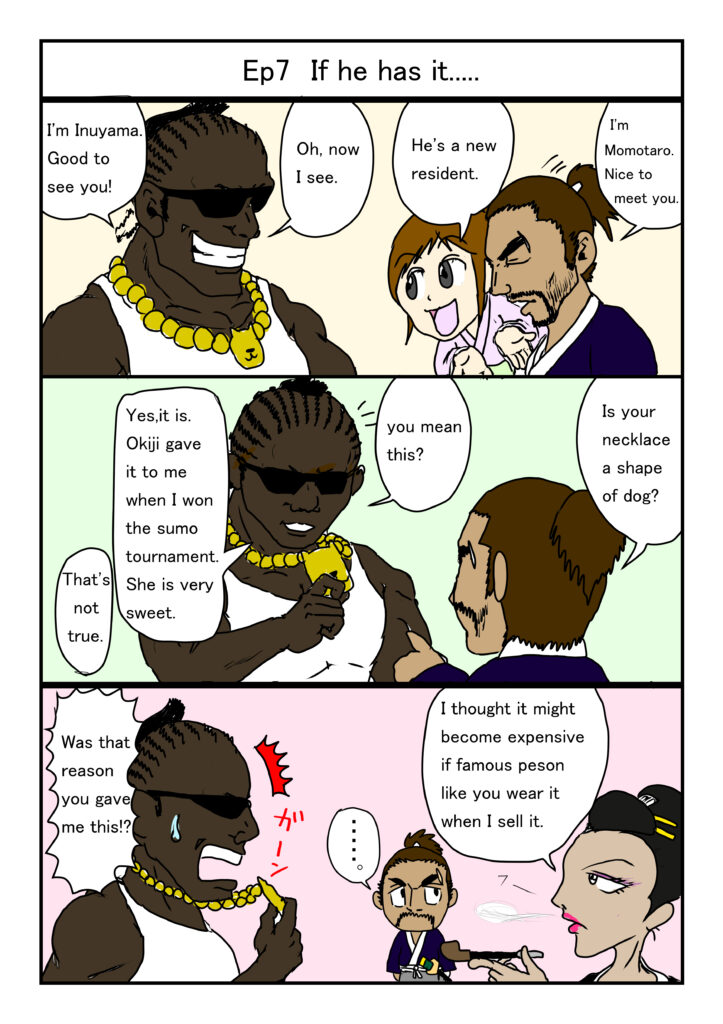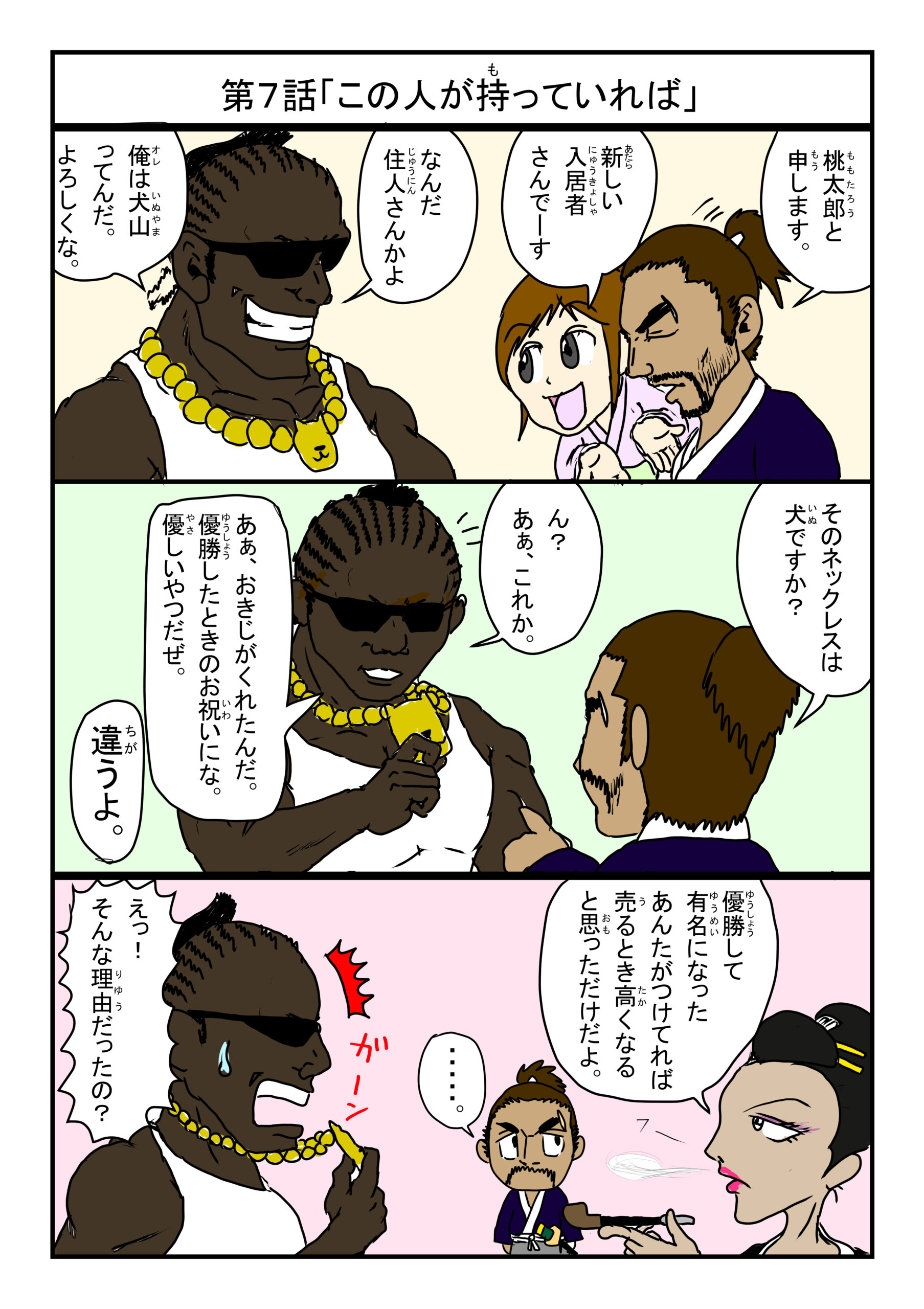
<このマンガの語彙/Words in this Manga>
【入居者 (にゅうきょしゃ) : Occupant/Tenant/Resident】
・入居者はだんごが定めたルールを守らなければならない。
【住人 (じゅうにん) :Resident/Inhabitant】
・桃太郎が新しい住人として加わった。
【ネックレス:Necklace】
・犬山はおきじにネックレスをもらった。
【優勝する (ゆうしょうする): Win/Be the champion】
・昔犬山は相撲の大会で優勝したことがある。
【お祝い (おいわい): Celebration/Congratulations】
・犬山さん優勝したんだって。お祝いしないとね。
【優しい (やさしい):Kind/Gentle】
・おきじさんはとても優しい人ですよ。
【やつ:Guy/Fellow】
・やつは悪いことを考えているにちがいない。
【違う (ちがう): Different/Incorrect】
・犬山の考えとおきじの考えは少し違った。
【有名 (ゆうめい):Famous/Well-known】
・犬山は相撲が強くて有名だ。
【ネックレスをつける:Wear a necklace】
・ネックレスをつけて出かける。
【売る (うる) :Sell】
・ネックレスを売る。
【高くなる (たかくなる):Become expensive/Rise in price】
・売ったネックレスが高くなる。
【理由 (りゆう):Reason/Cause】
・犬山はおきじがネックレスをくれた理由にショックを受けた。
<このマンガの文法/Grammar in this Manga>
【条件形(じょうけんけい):Conditional form】
<条件形の作り方>
1グループの動詞は、ますを「え段の音」に変えて、「ば」を足します。
例:もちます→もてば、かきます→かけば
2グループの動詞は、「ます」を「れば」に変えるだけ。
2:たべます→たべれば、ねます→ねれば
3グループの動詞は「来ます」は「来(く)れば」、「します」は「sれば」になります。
い形容詞は最後の「い」を「ければ」にします。
例:たのしい→たのしければ、あつい→あつければ
な形容詞と名詞は「なら」をつけます。
例:しずかな→しずかなら、ひまな→ひまなら、日本人→日本人なら、男→男なら
<条件形を使う時>
①条件形を使うのは、後件のイベントや出来事が起こるのに必要とされるものを前件で述べる時に使います。
・このボタンを押せば、ドアが開きます。
・明日いい天気なら、遊びに行こうか。
・天気がよければ、ここから富士山が見えます。
ただし、前件と後件の主語が一致するときに意志動詞が使えないことに注意が必要です。
✕)(わたしが)北海道へ行けば、(わたしは)すしを食べます
✕)(あなたが)北海道へ行けば、(あなたは)すしを食べてください。
〇)彼が北海道へ行けば、彼女もきっと行きます。
②ほかの人の発言や状況に対して、話者の判断を述べるときにも使います。
・質問がなければ、これで授業を終わります。
・「明日はちょっと忙しいんですが・・・」「明日が無理なら、明後日はどうですか?」
【Conditional Form】
<How to Form the Conditional Form>
For Group 1 verbs, change “ます” to the “e sound” of the “e row” and add “ば.”
Example: もちます (to carry) → もてば (if I/you carry), かきます (to write) → かけば (if I/you write)
For Group 2 verbs, simply change “ます” to “れば.”
Example: たべます (to eat) → たべれば (if I/you eat), ねます (to sleep) → ねれば (if I/you sleep)
For Group 3 verbs, “来ます” (to come) becomes “来れば” (if I/you come), and “します” (to do) becomes “すれば” (if I/you do).
For i-adjectives, change the final “い” to “ければ.”
Example: たのしい (fun) → たのしければ (if it’s fun), あつい (hot) → あつければ (if it’s hot)
For na-adjectives and nouns, add “なら.”
Example: しずかな (quiet) → しずかなら (if it’s quiet), ひまな (free) → ひまなら (if you’re free), 日本人 (Japanese person) → 日本人なら (if you’re Japanese), 男 (man) → 男なら (if you’re a man)
<When to Use the Conditional Form>
The conditional form is used when the first part of the sentence describes something necessary for the event or situation mentioned in the second part to occur.
If you press this button, the door will open.
If the weather is nice tomorrow, shall we go out?
If the weather is good, you can see Mt. Fuji from here.
Note: Be cautious about using volitional verbs when the subjects of the first and second parts of the sentence are the same.
✕ If I go to Hokkaido, I will eat sushi.
✕ If you go to Hokkaido, please eat sushi.
〇 If he goes to Hokkaido, she will surely go too.
The conditional form is also used to express the speaker’s judgment in response to someone else’s statement or situation.
If you have no further questions, class will be dismissed.
“I’ll be a little busy tomorrow…” “If tomorrow is not possible, how about the day after tomorrow.



コメント